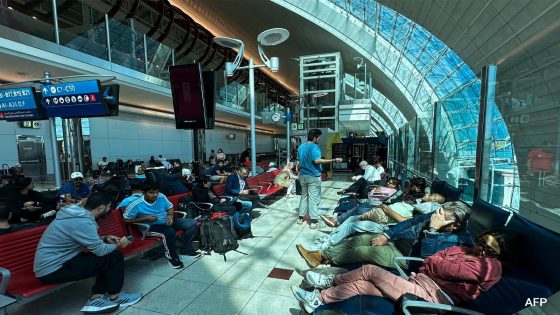The impact of the storm extended beyond Dubai
Dubai, the Middle East’s financial centre, has been paralysed by heavy rain and storm that has caused widespread flooding around the desert country.
The record rainfall has resulted in delayed or diverted flights, while cars have been left stranded on flooded roads.

Passengers have been warned not to come to Dubai airport, the world’s busiest by international traffic, “unless absolutely necessary”.
“Flights continue to be delayed and diverted. We are working hard to recover operations as quickly as possible in very challenging conditions,” a Dubai Airports spokesperson said.
Over 500 flights – both inbound and outbound – have been diverted, delayed or cancelled as the weather department predicts more rain and storms today.
Authorities have cancelled about 15 flights bound for Dubai, while 13 flights to India have been cancelled.
Dubai’s flagship Emirates Airline said it is halting all check-ins for passengers for the day as bad weather in Dubai has caused a travel chaos. “Emirates is working hard to restore our scheduled operations, and our teams will provide all possible support to affected customers,” the airline said in the statement.
Flagship shopping centres Dubai Mall and Mall of the Emirates both suffered flooding and water was ankle-deep at Metro stations. Officials said Metro trains are currently operating on specific routes as maintenance work is underway at stations on Red and Green lines.

The impact of the storm extended beyond Dubai, with the entire UAE and neighbouring Bahrain experiencing similar scenes of flooding and chaos.
Schools have been closed, and further storms, including hail, are forecasted for today, prompting authorities to extend remote working arrangements for government employees.

The storms and rain hit the UAE and Bahrain after lashing Oman, where 18 people were killed, including several children.
Official media said it was the highest rainfall since records began in 1949, before the formation of the UAE in 1971.
The country’s weather office “urged residents to take all the precautions and to stay away from areas of flooding and water accumulation”.
Both the Oman and the UAE, which hosted last year’s COP28 UN climate talks, have previously warned that global warming is likely to lead to more flooding.
Source Agencies




